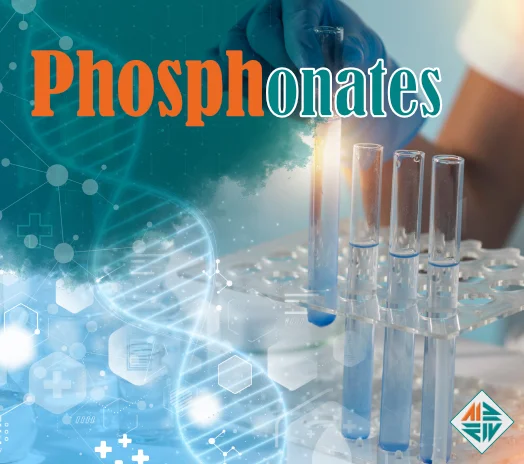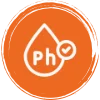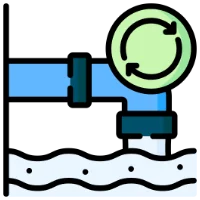Phosphonates

Phosphonates in India
Welcome to Maxwell Additives, your trusted partner in harnessing the power of Phosphonates. At Maxwell, our mission is to provide tailored solutions that optimize performance, ensuring that you stay at the forefront of efficiency and effectiveness.
Phosphonates are versatile chemicals with a wide range of functions and applications. Explore their role as scale and corrosion inhibitors in water treatment, chelating agents in detergents, stabilizers in industrial processes, and more. Discover how Maxwell Additives tailors Phosphonate solutions to meet your specific needs.
INQUIRY NOWOur Product Range
Our Product Range
PHOSPHOMAN-235
DTPMPA is innocuous, easy to be dissolved in acid solution. DTPMPA has excellent scale and corrosion inhibition and good thermal tolerance ability. DTPMPA can inhibit the scale formation of carbonate, sulfate and phosphate. On situation of alkali environment and high temperature (above 210℃) DTPMPA has better scale and corrosion inhibition effect than other organophosphines.
PHOSPHOMAN-230
Featuring a potent blend with 50% Poly Amino Poly Ether Methylene Phosphonic Acid (PAPEMPA), PHOSPHOMAN-230 stands as a water treatment marvel. Its unique formulation ensures exceptional scale inhibition and corrosion control, crafting a shield of efficiency for industrial water systems.
PHOSPHOMAN-111C
Rich in HEDP at 60%, PHOSPHOMAN-111C, also known as 1-Hydroxy Ethylidene-1,1-Diphosphonic Acid (Maxophos-111-c), is a cutting-edge water treatment solution.With unmatched scale inhibition and corrosion control properties, it redefines industrial water systems' vitality, ensuring longevity and peak performance with every application.
PHOSPHOMAN-222C
Harnessing the power of a 50% ATMP concentration, PHOSPHOMAN-222C, also known as Amino Tri Methylene Phosphonic Acid, emerges as a water treatment marvel. Its unique formulation guarantees superior scale inhibition and corrosion control in industrial water systems, offering an unparalleled shield of efficiency and durability, setting new standards in water treatment technology.
PHOSPHOMAN-333C
Harnessing a 50% PBTC concentration, PHOSPHOMAN-333C delivers unparalleled scale inhibition and corrosion control in industrial water systems, redefining efficiency in water treatment.
PHOSPHOMAN-224
Boasting a 60% HEMPA concentration, PHOSPHOMAN-224 excels in scale inhibition and corrosion control for industrial water systems, setting a high bar in water treatment effectiveness.
PHOSPHOMAN-124PN
Featuring Ethylene Diamine Tetra Methylene Phosphonic Acid, this formulation ensures robust scale inhibition and corrosion control in industrial water systems.
PHOSPHOMAN-444C
Enriched with a 50% MMBPA concentration, this formulation, based on Morpholino Methylene Bis Phosphonic Acid, excels in industrial water systems, providing robust scale inhibition and corrosion control.
IMPORTANCE
Functions of Boiler Water Chemicals

Corrosion Control
They protect metal surfaces by forming a protective layer, preventing corrosion and extending equipment lifespan.

Chelation
Phosphonates act as chelating agents, sequestering metal ions, enhancing cleaning and detergent effectiveness.

Stabilization
They stabilize metal ions in various applications, such as in agrochemicals and water treatment, ensuring consistent performance.

pH Buffering
Phosphonates help maintain stable pH levels in industrial processes, ensuring optimal conditions for chemical reactions and preventing scale deposition.
Applications of Boiler Water Chemicals

Water
Treatment
Phosphonates are
extensively used in water treatment processes to control scale formation and corrosion in industrial boilers and cooling water systems. They chelate with metal ions, preventing the formation of scale and improving the efficiency of water systems.

Detergents and Cleaning Products
Phosphonates are added to detergents and cleaning products, such as soaps and dishwashing liquids, to enhance their effectiveness. They sequester metal ions present in hard water, preventing the formation of soap scum and improving the overall cleaning performance.

Agricultural and Horticultural Applications
Phosphonates are utilized in agriculture as fertilizers and plant growth regulators. They provide a source of phosphorus, an essential nutrient for plant growth. Additionally, they enhance nutrient uptake in plants and improve their resistance to diseases caused by fungi and bacteria.

Oil and Gas Industry
In the oil and gas industry, phosphonates are employed as scale inhibitors and corrosion control agents. They help prevent the deposition of mineral scales in pipelines and equipment, ensuring the efficient flow of oil and gas. Phosphonates also protect metal surfaces from corrosion, prolonging the lifespan of equipment and infrastructure.
Safety and Handling Considerations
Safety is paramount in any application. Delve into essential safety and handling considerations when working with Phosphonates. Maxwell Additives is committed to ensuring responsible use and environmental sustainability in your operations.

FAQ's
Phosphonates are chemical compounds containing a phosphorus atom bonded to oxygen and carbon atoms. They are used for various industrial and commercial purposes, such as water treatment, detergents, and scale inhibition.
Phosphonates work in water treatment by binding with metal ions and preventing scale formation. They can also inhibit the growth of certain microorganisms, making them useful in cooling water systems and boilers.
Phosphonates are generally considered environmentally friendly when used in recommended concentrations. However, excessive use can lead to environmental concerns. Proper disposal and adherence to regulatory guidelines are essential to minimize environmental impact.
Yes, phosphonates are used in agriculture as chelating agents and as a source of phosphorus. They can improve nutrient uptake in plants and enhance their resistance to diseases.
No, phosphonates and phosphates are different chemical compounds. Phosphonates contain a carbon-phosphorus bond, while phosphates contain a phosphorus-oxygen bond. Phosphates are more commonly found in nature and are essential nutrients for plants and animals.
Yes, phosphonates can be used in drinking water treatment to control scale formation and corrosion. However, their usage and concentration levels are strictly regulated to ensure the safety of the treated water.
When used as directed, phosphonates generally do not pose significant health risks to humans. However, prolonged exposure to high concentrations may cause skin or eye irritation. It is important to follow safety guidelines and wear appropriate protective equipment when handling phosphonate-containing products.
Yes, phosphonates are used in some personal care products, such as shampoos and cleaning agents, due to their ability to sequester metal ions and improve product stability. However, their usage is carefully regulated to ensure consumer safety.
Phosphonates can be biodegradable under certain conditions, but their degradation rates depend on the specific chemical structure and environmental factors. Biodegradability can vary among different phosphonate compounds.
Yes, phosphonates can be used in swimming pools to control scale formation and prevent calcium and metal ion buildup. Proper dosage and monitoring are crucial to maintain water quality and prevent equipment damage.
